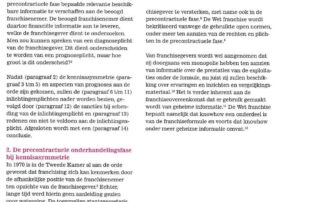Article Franchise+: “How far does the protection of a non-compete clause extend?” – mr. AW Dolphijn – dated March 8, 2022
A franchisor invests a lot of time, energy and money in its franchise formula. These investments contribute to the improvement of the market position of the format and its affiliated franchisees. Naturally, a franchisor wants to protect its (investments in the) formula. In doing so, she wants to prevent someone from appropriating the formula’s know-how in order to use it for their own gain outside the formula. For this reason, almost all franchise agreements contain a post-contractual non-compete clause.
The use of such a non-compete clause is subject to specific conditions by the Franchise Act. For example, the clause must be laid down in writing and must be indispensable for the protection of the transferred know-how. In addition, it may only apply for one year after the end of the franchise agreement and must be limited to a prohibition on activities related to goods and services that compete with the goods and services covered by the franchise agreement. The clause may not extend beyond the area within which the franchisee has operated the formula. If a non-compete clause meets all these conditions, a franchisor can use the clause to try to prevent unfair competition.
In order to obtain the intended protection, drawing up a non-compete clause requires a lot of precision. Not only must the requirements of the Franchise Act be met, but consideration must also be given to the evasive routes that franchisees may take to circumvent a non-competition requirement. The fact that having a general post-contractual non-competition prohibition alone can be insufficient, followed from the judgment of the preliminary relief judge of the District Court of The Hague of 4 February 2022 (ECLI:NL:RBDHA:2022:993).
In this case, the franchisor (Multicopy) had concluded a franchise agreement with a private limited company whose director had co-signed the agreement in private. This franchise agreement contained a provision prohibiting the franchisee from directly or indirectly engaging in competitive activities after the termination of the agreement. Although such a provision appears to be sufficient in most cases, especially now that the director had co-signed in private, the franchisor failed to do so in this matter. Before the franchise agreement ended, the franchisee had sold the company to a company set up by the partner of the (director of the) franchisee. This company continued the business. The court in preliminary relief proceedings rejected the franchisor’s appeal against the prohibition of competition. In the opinion of the preliminary relief judge, there was no contractual prohibition on the transfer of the company, so that this cannot constitute a violation of the prohibition of competition. Since it could not be demonstrated that the former franchisee was involved in the new company, no non-compete violation could be demonstrated. Therefore, the new company could not be accused of misuse of a violation. Multicopy’s claims to prohibit the continuation of the activities were therefore rejected by the preliminary relief judge.
From everything there is a strong impression that the franchisee and his partner have had the preconceived plan to circumvent the post-contractual non-competition clause and to continue the same activities after the franchise agreement has expired. However, the post-contractual non-competition prohibition has nevertheless proved to be insufficiently strong to break through the construction that has been set up. The franchisee has thus managed to slip through the cracks of this provision.
This sham construction could perhaps have been avoided with a finer-meshed agreement. In order to block this construction, many franchise agreements contain an addition to the post-contractual non-compete clause, in which the franchisee guarantees that the effect of the non-competition clause will not be frustrated by the intervention of a partner and/or family. In some cases, the signature of the partner of this specific provision is even requested. In addition, the sale of the company is often subject to conditions, which often include an obligation to make an offer to the franchisor.
For example, many formulas include a first right of purchase for the franchisor in the franchise agreement. As a result, the franchisee cannot (secretly) sell his business to third parties without first offering it to the franchisor. Any transfer of business in violation of these conditions then constitutes a breach of contract, which gives the franchisor a stronger legal position to act against possible bogus constructions. Now that the preliminary relief judge has ruled that the transfer of the company is not in violation of the non-competition clause, Multicopy’s franchise agreement in all probability does not contain any provision in which the transfer of the franchisee’s company is subject to conditions.
If Multicopy’s franchise agreement had contained such provisions, the judgment of the preliminary relief judge might have been very different. Drafting a post-contractual non-compete provision, and related provisions, therefore often requires customization.
Ludwig & Van Dam lawyers, franchise legal advice.
Do you want to respond? Then email to dolphijn@ludwigvandam.nl

Other messages
Unilateral changes to opening hours are prohibited from 1 January 2022
On July 14, 2021, a legislative amendment to the shopping ...
Litigation as a franchisees association.
The Eye Wish Opticiens franchisees have recently filed opposition to ...
Between the franchisor’s diagnosis and forecasting duty
In the leading legal scientific journal WPNR, Mr. Dolphijn a ...
Franchise+ article: “Violation of a non-compete clause will cost the franchisee dearly.” – mr. C. Damen – September 23, 2021
The fact that the violation of a non-compete clause included ...
Article De Nationale Franchise Gids: “Unjustified cancellation by the franchisor: settle the bill.” – mr. C. Damen – dated September 20, 2021
The preliminary relief judge in Rotterdam recently ruled that the ...
Interview Mr. AW Doplphijn in Distrifood: “Legal consequences of merger Plus-Coop for entrepreneurs.” – dated September 12, 2021
"Dolphin hereby cites a theory that is also alive among ...





